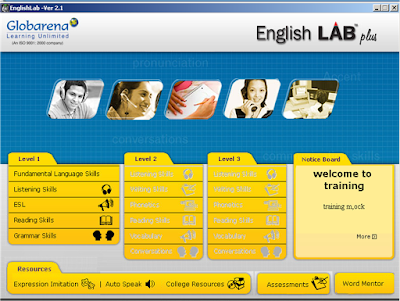Hello readers,
This blog is a part of my classroom activity on Language lab software.
To show worksheet of given task click here.

What is a language lab?
Modern
language labs are known by many names, digital language lab, multimedia
language lab, language media center and multimedia learning center to name but
a few. View the video and read the text below to learn more.
Language Lab means, "A classroom in which students learning a foreign language can practice
sound and word patterns individually or under supervision with the aid of audio
equipment"
History of the language laboratory:
The middle
of the 20th century was an exciting time for
foreign language study in the United States. During World
War II, the army created
the Army Specialized Training Program (ASTP) to provide education to officers
with strategic wartime skills, including foreign language proficiency.
Following the scholarly opinion among linguists of the day, who believed that
language was acquired through habit, the ASTP taught language primarily through
oral drills. As the ASTP spread to institutions of higher education throughout
the country, the army developed audio discs in dozens of languages. (Kitao)
The word ‘laboratory’ originated in the late 15th century. It
refers to a specific structure or a room for mixing chemicals and preparing
medicines by science experts. Scientists used to follow structured steps to
perform their experiments and research purpose. Through the Language lab we are
being four skills master and that are the Listening, Speaking, Reading and
Writing. Language laboratory also played an important role in the language
learning process. Language lab is a class of English language learning where
teaching learning process happens computers and other technical support. For
language learning students individually use a computer which is connected with
a server.
Advantages of language lab:
There are many
advantages of the language lab, that are…
1)A Language lab is more practical.
2) Student learn much faster in the language lab software
3) Use of more resources and varied activities than in the traditional
classroom.
4) Language lab allow for diversity in the classroom
5) Lab foster communication in the classroom
6) Able to test listening and speaking skill.
7) It helped to learn LSRW skill in a batter way.
8) With the help of language lab we develop our proper pronunciation.
9) Vocabulary development
10) Tenses, active – passive and module auxiliaries can be improved with
right structure of sentences.
Disadvantages of language lab
1)Students did not have enough time in quarter system
2) Students need to study reading most.
3) Student heard many noise in the earphones so sometime student get
bored in Learning language.
4) Without the Language lab student also increased the batter grade.
5) It is become little bit boring because it tack more time when
some software do not support properly.
Past, present, future of language laboratory:
Past:
In 1950s, language laboratories were established to provide language
training with advanced technology for language learners. In early history,
phonographs, (a kind of record player) was used to record sound and became a
tool for teaching foreign languages in the nineteenth century. The first of
them was established at the University of Grenoble in 1908. There were many
innovations developed in this period that are includes the transistor portable
radio in 1954, the stereo LP in 1958, the compact audio-cassette, the first home
Sony video tape recorder in 1963, and Dolby Noise Reduction in 1968. This all
invention become most important to learn Language laboratory very effectfully.
Present:
Since 1950s, language laboratories have been developed. The old-style
language labs that a teacher arranged the listening practice allowed with a
hard-wired analogue tape deck based systems with 'sound booths' in fixed
locations that are become outdated. During 2001-2007, portable music players
became a great achievement of language laboratories. At that time language
learning through podcast became more significant. It is similar to listening to
radio or watching a TV show. In a language classroom, students can be both
learners and also producers. A teacher can simply record his/her teaching and upload.
Those who miss that class or want to review the lecture can download the lecture
podcasts for later listening on their computers or mobile devices. MP3s players
are now available at low prices while PCS, laptops, tablets or smart mobile
phones are common devices usually owned by most students. When podcasts are
made available on the Internet, the teacher can direct their learners to them
for self-study purposes or even use them for listening in class via a computer.
Future:
In future language learning happen with the electronic media or e-media. e-Learning
will undoubtedly be with EFL management, it is very difficult to say what the
labs in the future EFL classes will be like. In fact the question is whether
language laboratories will exist. Observing the trend, media in EFL learning
can be supported and delivered with digital technology rather than from
physical language labs.
Thank You
Works Cited
BARRUTIA,
RICHARD. THE PAST, PRESENT, AND FUTURE OF LANGUAGE LABORATORIES. n.d.
21 February 2018. <http://www.jstor.org/stable/338842 .>.
Khampusaen,
Dararat. "Past, Present and Future: From Traditional Language
Laboratories to Digital Language Laboratories and Multimedia ICT Suites."
n.d. 21 February 2018.
<http://www.ijcim.th.org/SpecialEditions/v21nSP2/02_08_14E_Dararat.pdf>.
Kitao, Kenji. The
History of Language Laboratories Origin and establishment. n.d. 21
February 2018. <https://eric.ed.gov/?id=ED381020>.
Roby, Warren B. TECHNOLOGY
IN THE SERVICE OF FOREIGN LANGUAGE LEARNING: THE CASE OF THE LANGUAGE
LABORATORY. n.d. 21 February 2018. <https://pdfs.semanticscholar.org/ebc8/687dde1b89deaf01cc53de2084de54ebc2db.pdf>.





Awsome blog, keep sharing such blogs. With the free remote connections we are able to control our software and, if necessary, provide support to the teaching staff with small tips to make the best use of the software and to the technical staff to perform the various updates.
ReplyDeleteVideo Language Streaming Software